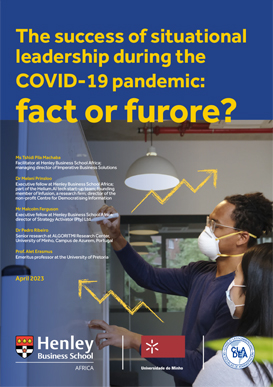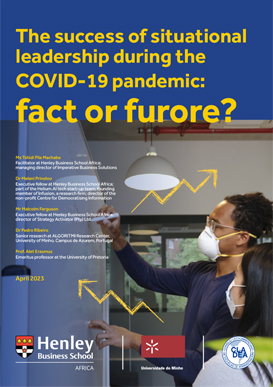HBS Africa White Paper Series:
“The success of situational leadership during the COVID-19 pandemic: fact or furore?”
The researchers are participants in the Latin American Council of Management Schools (CLADEA) Project Management Research Group focusing on the “impact of situational leadership in times of crisis on project outcome
By: Ms Tshidi Pila Machaba, Dr Melani Prinsloo, Mr Malcolm Ferguson, Dr Pedro Ribeiro, and Professor Alet Erasmus

The abrupt, severe and worldwide impact of the COVID-19 pandemic tested leaders like never before. In an “adapt or die” atmosphere, those who were able to respond skilfully to the situation at hand, drawing on four distinct “situational leadership” styles – namely directing, coaching, supporting, and delegating – to optimise their team’s performance, were more likely to not only survive – but thrive.

Situational leadership revisited
This white paper, authored by a global team of researchers, sets out to understand why, during the COVID-19 pandemic, some companies failed, and others thrived. Researchers analysed virtual interviews with representatives of 17 companies, across two diverse sectors – technology and health.
Previous research has demonstrated that team performance is enhanced when team members experience a fit between the style required by the situation, and the style they received. This research set out to affirm this assumption and to examine the veracity of the situational leadership model, initially presented by Hersey and Blanchard (1969), an approach where leaders adapt their leadership style according to the prevailing circumstances.
The study focused on critical incidents that impacted the commercial projects of companies from the perspective of project leaders and team members, and set out to identify influences from other organisational actors as well as contextual factors that influenced their behaviours and actions during the time.
Four leadership styles: directing, coaching, supporting and delegating
At the onset of the COVID-19 lockdowns, project managers had to make decisions quickly to safeguard business functions and revenue streams while also looking after employees’ well-being. The majority of successful project managers surveyed (82%) understandably therefore implemented a directing leadership style, meaning these leaders provided strong direction to their teams. Interventions included hard decisions such as retrenching employees to preserve members critical to delivery, investing in IT infrastructure, adequately resourcing projects and guarding against bankruptcy.
A directing style was most often complemented by coaching and supporting styles. Sixty-five percent implemented the coaching leadership style, where emotional and practical support was provided to teams and clients, while 53% utilised a supporting style, where leaders provided more support than direction to the team.
Just 41% of leaders delegated in order to continue offering their products and services during the various iterations of COVID-19 lockdowns. These were mostly technology companies that had historically worked with teams dispersed across offices and countries, having experienced working remotely, and being focused on improving their coaching and delegation situational leadership capabilities.
A blueprint for leadership in crisis
The diverse sample in this research provided invaluable insight concerning businesses’ behaviour and management styles during a crisis, confirming, in particular, the relevance and fluidity of situational management styles. “It’s clear that situational leadership presents a useful model to understand the nature of leadership required in project management,” the paper’s authors write.
While the availability of resources and relevant skills in each organisation, as well as the level of maturity in its client base and the existence of clear organisational goals, also play a key role in determining success, in an atmosphere
of ‘adapt or die’, good leadership emerged as the only solution to facilitate rapid change, and the agility needed to survive in a highly volatile global marketplace.

